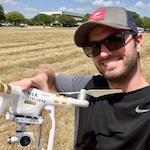Jason Bartling

My name is Jason Bartling, and I live in San Marcos, TX. I'm a GIS major at Texas State University.
It's great to finally be graduating this December! Some things I enjoy are movies, music, and books.
In my spare time I've been trying to polish up on my Python programming skills and my drone piloting ability.
Ian Kelly

I am a graduating senior GIS major. This is my first time coding but I enjoyed the difficult lessons and look forward to the final capstone project. I enjoy hiking and camping having recently visited Zion NP in Utah and look forward to
an upcoming trip to Big Bend. The drone pictured was used in a UAS mapping project with Dr. Jensen.
Brandon Rose

Currently I am a Graduate Student working toward my Masters of Geography at Texas State University. I graduated from Texas State with a bachelors in GIS and a minor in Computer Science in 2017. My areas of interest are Remote
Sensing/GIS, Geovisualisation, and Physical Geography. Like my team members I also operate sUAS’s for both mapping and as a hobby.
Austin Traffic Incidents
A project to map and visualize traffic incidents in
Austin, TX
Austin Traffic Incidents is a web interface for displaying
historic traffic incidents with multiple temporal scales, a query
function to search by incident type, a geocoder to search by an
address, and a heat map showing the areas of greatest concentration
of incidents. On initial load the application displays active
incidents grouped by predefined classes; Crash, Hazard, and Advisory.
These classes give a general idea of incident severity
which helps give the user a quick summary of incident information for
the city. The UI provides an area to access the specific functions of
the application. First is the Legend tab; here a legend is
provided which updates as the user interacts with the data.
Second is the Search tab; here the user queries the data by
indicating a date range of previous incidents as related to the date
accessing, selecting 5 incident types for visualizing, selecting how
to display the results, and finally executes by clicking submit.
Lastly is the Locate tab; here the user selects a buffer
radius and inputs an address, results are a buffer
containing incidents within the user selected range symbolized by
predefined classes. Users are also provided with an option to
generate a chart or table for detailed information about the area
specified.
Incident Classes as defined for Ausitn Traffic Incidents
Crash
AUTO/ PED,
BOAT ACCIDENT,
COLLISION,
COLLISION/PRIVATE PROPERTY,
COLLISION WITH INJURY,
COLLISN / FTSRA,
COLLISN/ LVNG SCN,
Crash Service,
Crash Urgent,
FLEET ACC/ INJURY,
TRAFFIC FATALITY
Hazard
Traffic Hazard,
Traffic Impediment,
TRFC HAZD/ DEBRIS,
HIGH WATER,
ICY ROADWAY
Advisory
BLOCKED DRIV/ HWY,
LOOSE LIVESTOCK,
N / HZRD TRFC VIOL,
VEHICLE FIRE,
zSTALLED VEHICLE
Links
GitHub Repository for Austin Traffic Incidents
Real-Time Traffic Incident Reports from The City of Austin
Socrata Open Data API
ArcGIS API for JavaScript
HERE Map Tile API
Chart.js - Simple yet flexible JavaScript charting for designers & developers
Tippy.js - A highly customizable vanilla JS tooltip & popover library
Appendix
Jason Bartling
Data load queries, search tool, locate tool, loading spinner implementation, map reset and zoom
Ian Kelly
HTML, CSS, animation JS, chart, table, and live traffic congestion layer
Brandon Rose
Initial data display, data visualization, legend, class, heatmap, and incident type renderers

